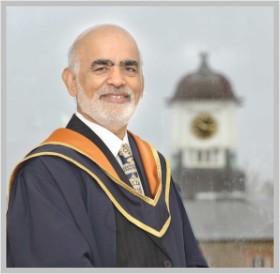By Vishav
New Delhi–Even as India moved into the top 100 for the first time in the World Bank’s Ease of Doing Business global rankings, there’s a lot more that needs to be done to keep up with the rest of the world, said Diljit Rana, one of the UK’s top businessmen and a member of the House of Lords.
Rana, originally from Punjab who built a £60 million empire from scratch in Northern Ireland, said there was an urgent need to bring India’s archaic regulations into the 21st century environment.
Planning to build a world-class university in Punjab, Rana told IANS in an interview that he faced serious bureaucratic hurdles.
“Planning laws are a bit outdated here. For university approval, there is a mandatory condition which requires to have so much land. Like in Punjab, to get approval as a private university, the minimum land requirement is 35 acres,” Rana told IANS in an interview during a visit here.

“But there are many universities across the world which have much less land. And they are world famous universities. So to put a condition for having so much land for university approval — especially in the age where we are going all electronic — it does not feel right,” he said.
He added that land in Punjab is anyway scarce and very expensive and instead of such requirements, the focus should be on the quality of education.
“What we should be concerned about is the quality of teaching, the faculty and the collaboration with foreign universities to lift our standards. Because the world is changing so much and so fast that half of what we teach these days, nobody would need those subjects in 20 years time. We need to concern ourselves with that,” he added.
Rana currently runs an education project — Lord Rana Edu-City — in Sanghol, his birthplace in Punjab, where too he had faced problems with the bureaucracy as the grant for Scheduled Caste and Scheduled Tribe students amounting to around Rs 2 crore had been pending with the government for around two-and-a-half years now, he said.
“First, the Akali Dal government kept delaying and now the new government said they had no funds,” said Rana, who met the Finance Minister and the Chief Minister of Punjab regarding the issue.
“They promised. But the promise has not been fulfilled yet. So we are funding the education of these students, and it becomes a cash flow problem,” he added.
“There are other similar things in bureaucracy. For example, it took me nearly two years to get our own money back from the AICTE (All India Council of Technical Education). It’s not the government money. We had an endowment fund which is part of the conditions when you start business management course or something. They ask you to put an endowment fund. It matured and even after maturity, it took me two years to get it released,” he said.
Rana, who built a multi-million dollar hotel empire despite over two dozen bombings at some of his establishments during the sectarian violence in Northern Ireland in the 1980s, had to shelve his plan to invest in budget hotels in India.
“They have outdated planning conditions. First there are requirements like leaving certain portion of land unconstructed, which doesn’t make sense for budget hotels in today’s time in big cities. We have built hotels in major cities where we constructed on the 100 per cent of the area.
“Then there is demand for over-the-table and under-the-table money. I am not prepared to do that. So I had to shelve that plan for the time being,” he said.
Rana, now a wealthy entrepreneur with a property portfolio and hotels including the Crowne Plaza, went to Northern Ireland in the mid-1960s. Surviving the dreadful train journey from Pakistan after the Partition, the violence did not leave him alone even in Northern Ireland as he endured a series of terror attacks during the ethno-nationalistic violence in the region.
Starting with a restaurant in the new country, he overcame 26 bomb attacks on his establishments, and showed amazing resilience in rebuilding them, often having to start from scratch.
He visits India six-seven times a year to promote trade relations and to link UK universities with Indian universities and research institutes. (IANS)














